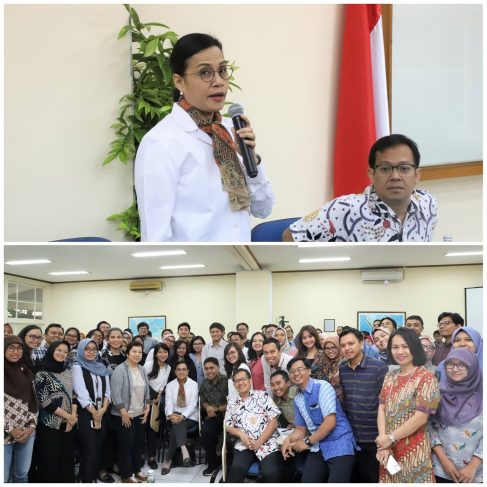Minister of Finance Sri Mulyani Explains State Financial Policy in MPKP FEB UI Public Lecture
Nino Eka Putra ~ Humas FEB UI
JAKARTA – In adding students’ insights to the Indonesian Economic Development Policy (KPEI) course, the Master Study Program in Economic Planning and Development Policy (MPKP) FEB UI held a Guest Lecturer Lecture by the Minister of Finance of the Republic of Indonesia which took place in room 1.5, 1.8, MPKP Building, in Monday (2/3/2020).
The Guest Lecturer took the topic “Fiscal Policy in Anticipating Global Uncertainty”. And opened by Vid Adrison as Chair of the Department of Economics, FEB UI and Gede Harja Wasistha as Deputy Dean II for Resources, Ventures and General Administration of FEB UI.
The Minister of Finance of the Republic of Indonesia, Sri Mulyani Indrawati said fiscal policy is a tool in making decisions on the use of taxes, transfers & government spending on goods & services in order to shift the aggregate demand curve. Fiscal policy is harmonized by the economic cycle in the form of a positive output gap that identifies the value of actual output that is higher than its optimum output, contractive fiscal policy, negative output gap, and expansive fiscal policy.

The main pillars of sustainable growth & economic stability are four pillars, namely monetary, fiscal, real economy and balance of payments policies. Thus, structural & development challenges include narrowing output gaps, global uncertainty in the form of increased macroeconomic competitiveness & stability, increased labor productivity & social protection effectiveness, increased productivity & competitiveness, and economic & industrial transformation 4.0.
On the one hand, the APBN as a fiscal policy is a very important policy instrument to fulfill Indonesia’s promises to its people in achieving a just & prosperous society. The APBN as an annual government financial plan approved by the DPR is regulated in Law No. 20 of 2019 concerning the TA Budget. 2020
“APBN management signs are used for 20% of the education budget, 5% of the health budget, 26% of the watershed budget, and 10% of the village funds. APBN 2020 posture is one of the efforts to realize the preparation of a transparent, accountable and sustainable state budget that is the hope of all Indonesian people,” he said.
The role of fiscal policy and the National Budget has three functions including stability, distribution and allocation. The realization of the 2019 state budget with state revenue of Rp1,957 trillion, state expenditure of 2,310 trillion. The realization of TKDD in 2019 increased by 7.1% from 2018 encouraging an increase in regional income with a debt ratio maintained at around 30% of GDP.
In 2019 the global economy will grow the lowest since the global financial crisis. Risk analysis to the domestic shows that the global economic slowdown has an impact on the economy of Indonesia through 3 channels, namely financial markets (capital flows to Indonesia are influenced by developed countries monetary policy), foreign investment (FDI / global negative sentiment can affect investor confidence), and trade (non-oil and gas performance is depressed, oil and gas balance deficit is still high).
“Fiscal Policy (APBN) 2020 with a foundation towards advanced Indonesia that focuses on accelerating competitiveness through innovation and strengthening the quality of human resources. Several policies & initiatives in improving the strengthening of human resources quality and competitiveness with tax incentives, improving the quality of human resources & social protection, accelerating the completion of 4 tourism destinations, strengthening transfers to the regions,” Sri Mulyani said.
In addition, 5 focus on central government spending in 2020, including preparing young people in improving the quality of human resources, improving people’s health, improving the welfare of low-income / poor / vulnerable poor people, infrastructure budgets, transfers to regions & village funds. Innovative & sustainable financing through debt control, developing creative & innovative financing, providing RPM.
“The current strategy to anticipate global uncertainty is through a fiscal buffer, flexibility, BSF, CMP Ministry of Finance, multilateral / bilateral arrangements. The urgency to redesign the budgeting system through central and regional programs needs to be synchronized as a performance achievement to be more optimal. “Planning, budgeting, implementation, monitoring evaluation & reporting are easier to consolidate, and development performance targets / targets,” he added.
He continued, in relation to the world of education, the academic role in educating the superior generation was needed in terms of cooperation, innovation, commercialization, up to date curriculum, cooperation in R&D, increasing competitiveness, appropriate policies for the community, and preventing skills mis match. “The message for MPKP FEB UI students is to continue to develop analytical & critical thinking, public policy is not one size fits all because Indonesia is very diverse & understands the general theory as well as the diversity conditions between adapt & adopt, as a prospective leader then develop emotional intelligence & think more logically, develop policies that not only strengthen governance & compliance but also support future progress, and be a positive virus in the institutions & the environment around you,” he concluded. (Des)














